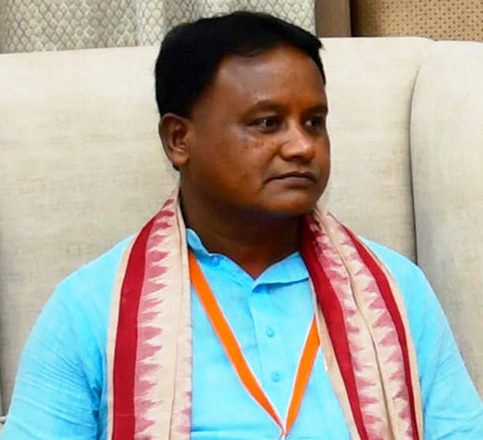Having scored a major political point against Biju Janata Dal (BJD), the main opposition party, with the launch of Subhadra Yojana Chief minister Mohan Majhi has now turned his attention to the development of industries. He wants to ramp up the state’s industrialization process and seems to have achieved a major success on this front with South Korean steel behemoth likely to make a comeback to the state.
The Mohan Majhi government is leaving no stone unturned to prove itself better than its predecessor. It made a beginning with the launch of Subhadra Yojana which is widely seen as an attempt at snatching the women vote-bank of Biju Janata Dal (BJD) which, after having ruled the state uninterrupted for 24 years, is now sitting in the opposition. The Yojana, which many believe could soon replace the preceding government’s much vaunted Mission Shakti aimed at the financial empowerment of women, was launched by the chief minister with much fanfare soon after coming to power.
The Majhi-led BJP government has also launched a major drive against corruption, once again looking to better the record of former chief minister Naveen Patnaik on this front. Majhi has made it clear that his government would have zero tolerance for corruption. State vigilance has already conducted a raft of raids against venal government officials and punitive action has been initiated against them.
Now there has been a major development on the industrial front with South Korean steel behemoth POSCO showing its keenness to return to the state from where it had to make an ignominious and controversial exit after its plans to set up a 12 million tonne steel plant in Jagatsinghpur district came a cropper with the land acquisition drive for the project hitting a roadblock. But the development has come as a shot in the arm for the BJP government that has been trying to bring investments to the state.
POSCO’s decision to back out of the Jagatsinghpur project in 2017 widely is seen as a failure of the Naveen Patnaik government. It had made Patnaik a target of criticism from his opponents. If the project comes about now it would be seen as a major achievement of Majhi government. The South Korean steel major recently announced its collaboration with Sajjan Jindal’s JSW Group in setting up an integrated steel plant of 5 million tonnes per annum (mtpa). Though the official statement did not mention any state, reliable sources confirmed that the plant would come up in the mineral-rich Keonjhar district, the home district of chief minister Mohan Majhi.
POSCO tried to test the waters in Odisha in 2005 when it decided to set up a steel plant worth Rs 50,000 crore in the coastal district of Jagatsinghpur, which was then billed as the biggest foreign direct investment (FDI) project in India. It ran into trouble over land acquisition and getting a mineral block amid protests by locals. After waiting for over 12 years, the company in 2017 officially withdrew from the project.
The BJP claims that the South Korean company’s impending return indicates that the change in government had had a positive impact on the investment climate in the state. Sources said the Majhi government had approved the officials concerned to ensure the “smooth grounding” of the greenfield project. Procuring raw materials for the project should not be a problem as JSW already owns iron ore blocks in the state.
Sources said after an offer from the state government, top JSW officials had already visited two possible sites in Keonjhar: Banspal (2,500 acres) and Patana (nearly 2,000 acres). The JSW-POSCO collaboration is expected to officially sign an agreement with the state government during the Utkarsh Odisha conclave scheduled to be held in January. While the companies have yet to reveal the total investment in the project, officials said it would be more than the amount POSCO had previously committed. According to them, it is estimated to be more than Rs 50,000 crore.
Sources said the JSW-POSCO entity plans to develop the steel plant using green technology to reduce greenhouse gas emissions. The company will generate thousands of direct and indirect employment opportunities for the youth. Since assuming office, Majhi has been attempting to get a steel major to build a plant in Keonjhar, which has more than 30% of the country’s total iron ore reserves. In August, the state government formed a task force headed by Chief Secretary Manoj Ahuja to scout for a possible investor for the proposed steel plant. Officials said they approached leading steel makers in the country to set up a plant, promising them that the government would facilitate the quick acquisition of land and raw materials and ensure other clearances.
When the CM approached the JSW and POSCO officials during roadshows in Delhi and Mumbai and got a positive response, officials started working overtime to ensure that things worked out smoothly on this front. While the BJP is attempting to portray POSC’s second foray into the state as a victory and a commentary on Naveen Patnaik government’s track record on industrial development, the BJD has questioned the intentions of the South Korean company and sought a clarification from the chief minister.
The government is simultaneously working to ensure a better law and order climate in the state with law minister Prithviraj Harichandan asserting that criminals will be dealt with sternly. His statement came in the wake of Cuttack gangrape incident which has triggered a major controversy. The government has asked Odisha police to intensify its drive against Maoist ultras and part of the strategy to beat the rebels back is to step up the war against the illegal cannabis trade by using drones and satellite images from ADRIN (Advanced Data Processing Research Institute) to destroy the illegal hemp cultivations in different parts of the state.
Illegal hemp plantations are a major source of income for the Maoist ultras who allegedly patronize its cultivation in the districts of their dominance, such as Malkangiri, Koraput and Kandhamal. In a bid to break the economic backbone of the ultras the state government is consciously trying to destroy hemp plantations. It is also acting against other kinds of contraband. In 2023, it destroyed 220 tonnes of Marijuana and 78kgs of brown sugar.
“Cannabis cultivation and trade are illegal. We need to destroy cannabis which is believed to be a source of income for the Maoists. We are focusing on destroying cannabis cultivation in a more coordinated manner,” said an officer, adding that focus districts are Malkangiri, Koraput, Rayagada, Gajapati, Kandhamal, Boudh, Ganjam, Nabarangpur and Mayurbhanj.
Director General of Police (DGP) YB Khurnia has visited the Maoist-hit belt of Malkangiri and Koraput and reviewed the progress made by the police to contain the Maoists activities in these areas and also steps taken to stop the illegal cannabis trade. The intent of the government is clear. It wants to put an end to anything that hinders the state’s progress.







































